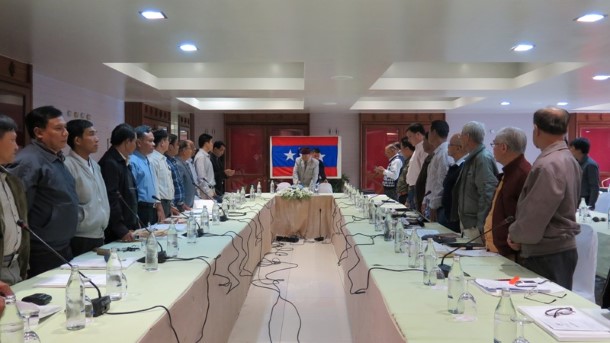RANGOON — The United Nationalities Federal Council (UNFC), an 11-member ethnic alliance, has voted to uphold the suspension of two of its member groups that were among eight signatories to a “nationwide” ceasefire agreement signed in mid-October.
On Tuesday, the second day of a four-day summit of UNFC member groups in Chiang Mai, northern Thailand, attendees voted to uphold a decision to suspend the Chin National Front (CNF) and the Pa-O National Liberation Organization (PNLO) that was provisionally agreed upon at an emergency meeting convened last month.
“We continue to keep them as suspended members,” Nai Hong Sar, UNFC vice-chairman, told The Irrawaddy. “There were vacancies for two joint general secretary seats of the UNFC. We elected two new members by voting this morning [Nov. 8].”
Salai Lian Hmong Sakhong, a CNF leader, told The Irrawaddy last month that the move was not in accordance with the UNFC charter.
“They [the UNFC] did a thing that they should not do. They said they are angry that we signed the NCA—the text we all agreed in drafting,” he said.
Many UNFC members are also members of the Nationwide Ceasefire Coordination Team (NCCT), a body tasked with leading negotiations with the government on a nationwide ceasefire agreement.
The Oct. 15 signing of the so-called nationwide pact included eight non-state armed organizations, including the CNF and PNLO, but several of the country’s biggest ethnic armed groups opted not to sign, citing the government’s unwillingness to countenance a more inclusive accord.
The Karen National Union (KNU), a ceasefire signatory, suspended its membership with the UNFC in September last year and no representative attended this week’s summit in Chiang Mai.
Addressing alliance members on Monday, UNFC chairman N’Ban Hla, who is also vice-chair of the Kachin Independence Organization, said the looming change of government in 2016 offered ethnic armed groups an ideal chance to fight for their political rights at the negotiating table.
“The new incoming government has a better relationship with us… This is a great chance for us,” he said, while also sounding a note of caution on the role of Burma’s military in negotiations.
The four-day dialogue focused on how to take the peace process forward in 2016, with the UNFC chairman declaring the alliance was “ready to talk” about all issues and hoped the government would reciprocate, particularly on sensitive topics such as the establishment of a federal army.
UNFC members also pledged to abide by their stance of pushing for an all-inclusive ceasefire agreement with Naypyidaw.
Additional reporting by Khin Oo Tha in Chiang Mai, Thailand.

















